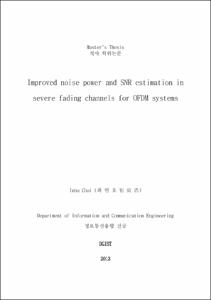Improved noise power and SNR estimation in severe fading channels for OFDM systems
- Title
- Improved noise power and SNR estimation in severe fading channels for OFDM systems
- Alternative Title
- OFDM 시스템에서 극한 페이딩 채널 특성에 강인한 향상된 잡음 전력, 신호대 잡음비 추정 기법 연구
- Author(s)
- Choi, In ho
- DGIST Authors
- Choi, In ho ; Choi, Ji Woong ; Hong, Jae Sung
- Advisor
- Choi, Ji Woong
- Co-Advisor(s)
- Hong, Jae Sung
- Issued Date
- 2013
- Awarded Date
- 2013. 2
- Type
- Thesis
- Subject
- SNR estimation ; noise power estimation ; OFDM system ; fading channel ; 신호대 잡음비 추정 ; 노이즈파워 추정 ; OFDM 시스템 ; 페이딩 채널
- Abstract
- The purpose of this study is to estimate signal to noise power ratio (SNR) in a se-vere fading channels. Signal power and SNR estimation is hard to estimate in a severe fading channels because channel variation occurs more extremely. In this situation, noise power estimates are generally higher than the actual values because of channel estimation errors, channel variations, and multipath delays. Moreover, current communi-cation systems reduce pilot density to increase data rate. As a result, accurate SNR estimation is becoming more difficult. This paper analyses SNR estimation techniques and proposes improved signal and SNR estimation schemes in severe fading channels to reduce estimation error. We analyze representative SNR estimators. The proposed signal power and SNR estimators use a chan-nel estimation filter (CEF) and differential scheme. The simulation results show that the differential scheme SNR estimator provides better performance in severe fading channel. The proposed techniques can reduce error because they select a better condi-tion channel domain. The proposed SNR estimation technique uses OFDM characteristics in multi-dimensional domain. Channel status is different along the time and frequency domain. Choosing a better domain can reduce error in SNR estimation. The proposed SNR estimator uses SNR information of each domain to choose the proper domain. The simulation result shows that the proposed estimation technique can reduce estimation error up to 5dB in a frequency selective or fast fading channel.The study result can be applied to contemporary communication system channel esti-mation such as LTE and WiMax, which provide high data rates with low pilot density with high interference channel or fast fading channel. ⓒ 2013 DGIST
- Table Of Contents
-
Ⅰ. Introduction 1
--
Ⅱ. System description 5
--
2.1 OFDM system overview 5
--
2.2 Channel model for OFDM systems 8
--
2.3 SNR estimation in OFDM systems 11
--
Ⅲ. Comparisons of SNR estimation algorithms
--
3.1 Maximum likelihood (ML) estimation method in AWGN 12
--
3.2 Minimum mean square error (MMSE) estimation method in AWGN 13
--
3.3 Conventional SNR estimator in fading channel 14
--
Ⅳ. Proposed SNR estimation techniques 16
--
4.1 Noise power estimator using channel estimation filter (CEF) 16
--
4.2 Signal power estimator using CEF 17
--
4.3 Signal power estimator using differential scheme 18
--
4.4 Performance analysis 19
--
Ⅴ. Proposed SNR estimation techniques in multi-dimension domain 26
--
5.1 Noise power estimator using channel estimation filter (CEF) 26
--
5.2 Performance analysis 27
--
Ⅵ. Conclusion and future works 29
- URI
-
http://dgist.dcollection.net/jsp/common/DcLoOrgPer.jsp?sItemId=000002262488
http://hdl.handle.net/20.500.11750/1335
- Degree
- Master
- Department
- Information and Communication Engineering
- Publisher
- DGIST
- Related Researcher
-
-
Choi, Ji-Woong
- Research Interests Communication System; Signal Processing; Communication Circuit Design; 생체 신호 통신 및 신호 처리; 뇌-기계 인터페이스(BMI); 차세대 교차계층 통신 및 신호 처리; 5G 모바일 통신
-
- Files in This Item:
-
 기타 데이터 / 842.49 kB / Adobe PDF
download
기타 데이터 / 842.49 kB / Adobe PDF
download
- Appears in Collections:
- Department of Electrical Engineering and Computer Science Theses Master



